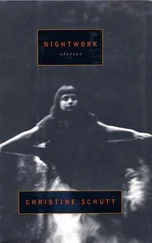She remembered other embarrassments. The class trip to the cheese factory where she stepped in something that stank up the bus. Those moments — all too many of them — when pride overrode discretion, and she let loose her voice in a communal song; she let her florid soprano flail upward and over the ordinary sound produced by those gathered at the start of the new school year. Her voice, a fat girl's vanity, drew too much attention in a school setting, and only in church could she freely sing. However had she managed to get through the first year at Siddons? Anna suspected it was finally her friend's good word, Sharon Feeney, the darling Miss F, who had known Anna at the university and had written on her behalf. The darling Miss F—"I can't carry a tune!" — was a favorite among the administrators. To be favored, a favorite, that was Anna's ambition, but she was not so confident of this happening as to decorate her apartment with the view of longstanding employment. This was her third year of teaching at Siddons.
Tim Weeks was thirty-three years old and had been at Siddons for six years. His apartment was darker and had no river view, but there was permanence in the oak shelves and books and photographs. Anna had no photographs; her personal history shamed her for being as ordinary as mud. Her mother had worked in a nursing home and her father on assembly at the GM plant. Their house was split-level in a ditched development, no water in sight, stunted trees, and culs-de-sac. Her father once in the car saying, "Oh lordy, Annie, it's just a fancy word for dead end."
Marlene
On clubs afternoons when Marlene was free — she wasn't a joiner — she walked to the hospital and sat with Astra Dell. If others were there or arrived, she cut the visit short and only left off whatever she had brought to read to her because Astra had said she loved being read to, so that is what Marlene did. She read stories from Dog Fancy 's "Therapy on Four Legs." She brought in stories about heroes and miracles that might make Astra feel good, and they did because she smiled when Marlene read them. Astra said, "Marlene, you're weird," but she smiled when she said this. Astra always thanked her, and she thanked Marlene in a genuine way. Her smile seemed to Marlene entirely sincere; even on those afternoons when she was in pain and noddy with medicine, when her voice broke and she only waved good-bye, Astra seemed glad to have seen Marlene, and so Marlene came to the hospital on other days, not just clubs afternoons. She would have visited on the weekends except the weekends were Mr. Dell's. On this day, as on so many days, Marlene Kovack left school and her last name — the nasal sound of it when said at school — she left behind, and she walked along the East River down the broad avenue to the hospital.
The spired entrance was marbled and churchlike in its serious human traffic, and Marlene was an old parishioner, a woman in black on her way to prayers. She didn't have to ask where, she knew. The back banks of elevators, the higher floor, the long corridor, turn left, and another five rooms down, and she was there, Astra's room, the door ajar and sometimes other visitors but most often not, most often on clubs afternoons it was only Marlene. Once when Miss Mazur and Mr. Weeks had come, Marlene had stayed on. She wanted to know teachers the way Astra knew teachers, and Marlene liked Mr. Weeks. Marlene did not know Miss Mazur, but it was her opinion — and she shared it later with Astra Dell — that Mr. Weeks felt sorry for Miss Mazur, which was why he was with her. Miss Mazur's face was wildly askew. Every feature went its own way, and her nose was a large distraction. Most clubs afternoons Marlene had Astra Dell to herself. Astra sometimes slept; she opened her eyes sometimes only just long enough to say, I'm not feeling very well. Astra wasn't feeling well on this clubs afternoon, so Marlene did not stay but left a note on the bedside table for her signed love. And for this, Marlene thought better of herself, and once home she was a sharpened arrow thrummed from the bow and hitting its target. Steadfast, selfless, purposed to comfort her friend, her only and her best. Couldn't she say that? Yes, Marlene thought, however unacknowledged, she was Astra's best friend.
A Daughter
The nurse informed them that Astra wasn't feeling very well today. "We won't stay long," Lisa said. Miss Wilkes in a louder voice to Astra, "We just wanted to say hello." Lisa moved away from Miss Wilkes so that Astra could see her and she could see Astra, but the sight of Astra weakly propped against the pillows surprised Lisa, who had not visited before and had had no idea of how worn away her friend would be, how see-through thin.
Lisa and Miss Wilkes, uncertain in the semi-dark of Astra's room, whispered to each other, was Astra asleep?
"I'm not asleep," Astra said.
"'How are you' seems like such a stupid thing to ask," Lisa said, "but how are you?" One stupid question after another followed. And afterward in the booth at the coffee shop, Lisa said she was stunned. Astra seemed to have shrunk already. Lisa said, "Obviously, I didn't know what to say."
Miss Wilkes was forgiving. She said she liked Greek coffee shops. Posters over every booth — white, hilly villages, crags to the sea. Behind the glass door in the refrigerated case the usual desserts, thickly frosted cakes, rice pudding, liquidy fruit.
Wet water glasses were swiftly set before them and then the heavy coffee-shop crockery, coffee for Miss Wilkes, hot water and a tea bag for Lisa, who sighed out how unfair it was, Astra Dell, how awful, how confusing, how messed up it was, and it was! No one ever said the world made sense, but Lisa had expected that hard work and earnest intentions would pay off to some degree. Maybe the school reward system was the problem. "We need a much more arbitrary system," Lisa said. "Grades should be picked from a hat." No more elections and auditions. The fateful nature of the world was what should be taught because outside of school that was how it was. Money, scarce among the teachers and rarely talked of and then as an evil, was undervalued in school when, in fact, it decided so much. Lisa said that Suki Morton would end up at Brown because of it.
"Who are the Mortons?" Miss Wilkes wanted to know.
"They're the soup people."
Miss Wilkes said, "I'm ignorant of high-end experience, so I don't feel the lack."
"I don't either," Lisa said, "at least not until the girls come back from spring vacation blonder and tan. Then I'm jealous." She shrewdly shoved aside her parents' summer home on the Jersey shore.
Miss Wilkes remembered a senior with high style whose disc player blew up in Dr. Meltzer's class. There were sparks, or that's what everyone said. Dr. Meltzer screamed at the girl, "Who do you think you are?" One of the drawbacks of the fourth floor: Dr. Meltzer was there, throwing chalk. "I hear him screaming a lot."
"Dr. Belt zer," Lisa said.
"So he said, 'Who do you think you are?' and she said, 'A Du Pont.'"
There were, in Lisa's opinion, so many ways to be disappointed in school. "Prize Day, if you want to know. Prize Day is a reason to give up. I lose sleep, friends, and hair, so I can sit through an eternity of the 'Everything Lisa can't do' show. I have to pay attention because my mother will want to know names so she can torture me with them."
"But you've won prizes."
"The nice-girl prize, yes, twice. I had them fooled."
"You're not a nice girl?"
"No," Lisa said, pulling at the skin on her thumbs, "I'm not a nice girl."
"I have that habit, too."
Lisa said, "I know." She said, "Graduation seems so far away," and she sighed theatrically. Lisa said, "I don't really want to talk to anyone at school anymore. Not because of you. Just because there is no reason to make an effort. It's not real at Siddons." Margaret Schilling and Jennifer Mann, stupid, glossy, social girls, not long out of Siddons, were on the gossip shows now. Margaret Schilling had recently posed in an emerald dress with a pug in her arms for one of those horsey magazines. "My mother buys Town and Country." Lisa thought many of the girls in her class were simply making themselves into the perfect corporate wives of tomorrow. "I heard, swear to god, word for word, Alex Decrow say, 'All I want is to smoke and party and marry a rich guy.'" Lisa thought that the importance of money should be taught; at least then girls would be prepared and might go through life less bitter.
Читать дальше












